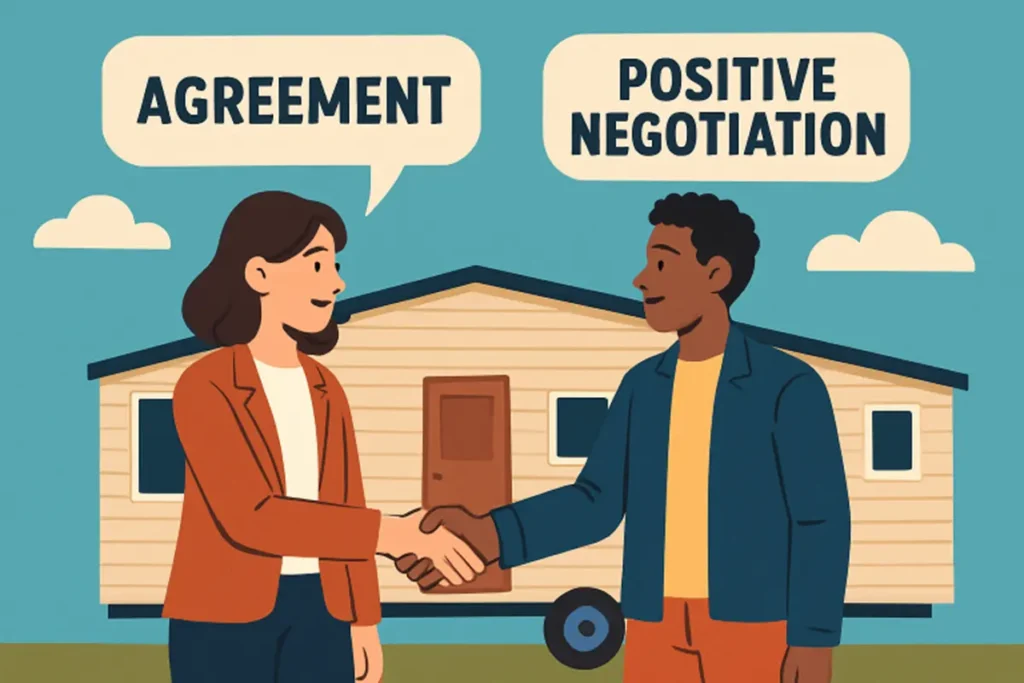Key Takeaways:
- Strong negotiation skills help secure better deals with mobile home buyers.
- First impressions—cleaning, repairs, and staging—boost buyer interest.
- Know buyer motivations and price your home based on local comps.
- Clear, calm communication fosters trust and smoother negotiations.
- Prepare for closing with accurate documents and a clear title.
- Cash offer options can simplify and speed up the sale.
Why Negotiation Skills Matter in Selling Your Mobile Home
Selling your mobile home isn’t just about setting a price and waiting for the right offer—it’s a process that hinges on strong negotiation skills. Effective negotiation with potential mobile home buyers can mean accepting a lower-than-market offer or securing a deal that reflects your home’s true value. Sellers who are skilled negotiators typically net higher profits and enjoy smoother transactions than those who approach negotiations casually or with uncertainty.
Preparing Your Mobile Home for a Successful Sale
First impressions have a powerful impact. Start by deep cleaning your mobile home, addressing needed repairs, and staging the living spaces for maximum appeal. Simple efforts like updating lighting fixtures, adding a fresh coat of paint, and ensuring tidy landscaping can make your mobile home stand out to buyers.
Repairs and staging aren’t just about aesthetics—they directly influence buyer perception and the speed of your sale. Highlight comparative sales (“comps”) in your community or area to reinforce the value you’re offering and ensure potential buyers realize they’re getting a fair deal.
For sellers seeking a faster, simplified route, consider options such as mobile home cash offer, which can provide a straightforward and efficient sales experience.
Understanding Buyer Motivations
The key to a successful negotiation is understanding what motivates mobile home buyers. Some seek affordability, while others value location, condition, or park amenities. Listening closely during showings and pre-offer conversations allows you to identify who is genuinely interested versus casually browsing.
Serious buyers often come prepared with pre-approval letters or solid financing plans and ask detailed questions about the home and the transaction process. Qualifying buyers early saves time and sets the stage for more productive negotiations.
Setting the Right Asking Price
Accurate pricing starts with diligent market research. Analyze recent sales in your mobile home park or neighborhood, evaluate current listings, and consider your property’s age, condition, and location. Overpricing can deter buyers; underpricing may leave money on the table.
Review real estate industry statistics to understand your area’s price trends and buyer expectations. Many real estate agents recommend pricing just below major round numbers to attract more attention—e.g., listing at $89,900 rather than $90,000.
Communication Strategies for Productive Negotiations
Open, honest, and proactive communication is vital throughout the negotiation process. Practice active listening by giving buyers space to voice their concerns, then respond thoughtfully rather than defensively. Clarifying questions help ensure you understand what matters most to prospective buyers.
High-stress moments can arise during negotiations. Stay calm and professional, focusing on the end goal rather than personal emotions. This composure often leads buyers to feel more confident about the deal.
Common Negotiation Tactics Used by Buyers
Buyers may use tactics such as lowball initial offers, referencing purported flaws, or comparing your home to others recently sold at lower prices. Some may ask for closing cost concessions or additional repairs.
Counter these maneuvers by coming prepared with your knowledge of comps and your home’s unique value. Be ready to explain the work you’ve put into the property or the costs that justify your asking price. Responding with a counteroffer is often effective rather than accepting or rejecting outright.
Reaching a Win-Win Agreement
The best deals leave both the seller and the buyer satisfied. If offers come in a bit lower than you’d hoped, look for creative solutions— perhaps you can include minor furnishings or adjust the closing timeline. Making small, calculated concessions can ease the path to agreement while protecting your bottom line.
Know your absolute lowest acceptable price and where you’re flexible. Sharing those boundaries clearly but respectfully helps buyers understand where you stand, and creates an atmosphere of trust.
Final Steps: Closing the Sale Smoothly
As negotiations wrap up and you move toward closing, expect paperwork, title transfers, and the coordination of funds and possessions. In most areas, you must provide a clear title, ensure outstanding fees are paid, and complete all forms required by your state or community. Every document must be accurately completed to protect both parties.
Wrapping Up
Selling a mobile home successfully combines preparation, pricing, and negotiation skills. By understanding buyer motivations, presenting your home at its best, and communicating clearly throughout the process, sellers can secure fair offers and close efficiently. Whether using traditional sales methods or exploring options like mobile home cash offers, a strategic approach ensures smoother transactions, faster sales, and outcomes that satisfy both sellers and buyers.
Also Read
- Tech Console DefStartup: Empowering Gaming Innovation
- How to Become Raja Luck in Real Life
- How Small Businesses Can Simplify Their Tax Filing Process


